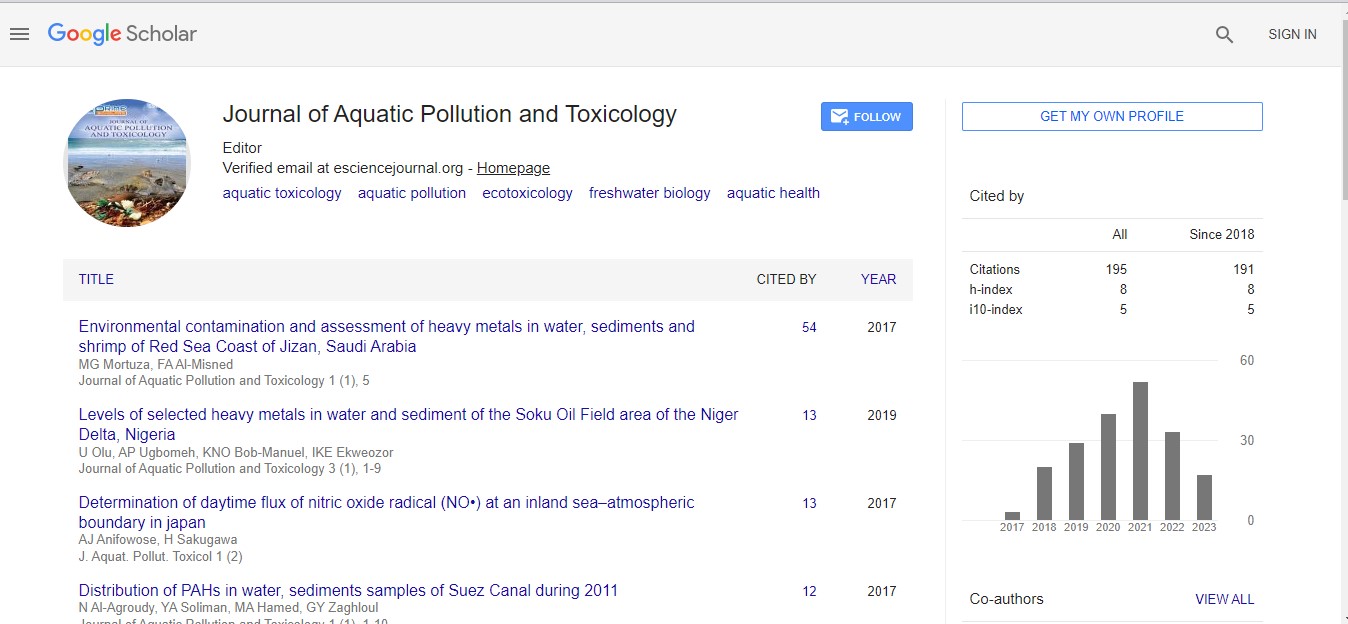Commentary - (2024) Volume 8, Issue 4
Fish: The Wonders of Aquatic Life
Sakura Kuroda*
Department of Aquatic Pollution, Kobe University, Japan
*Correspondence:
Sakura Kuroda,
Department of Aquatic Pollution, Kobe University,
Japan,
Email:
Received: 02-Dec-2024, Manuscript No. IPJAPT-24-22024;
Editor assigned: 04-Dec-2024, Pre QC No. IPJAPT-24-22024 (PQ);
Reviewed: 18-Dec-2024, QC No. IPJAPT-24-22024;
Revised: 23-Dec-2024, Manuscript No. IPJAPT-24-22024 (R);
Published:
30-Dec-2024, DOI: 10.21767/2581-804X-8.4.35
Description
Fish are among the most diverse and fascinating creatures
on Earth. With over 33,000 known species, they are the
most numerous group of vertebrates, occupying nearly
every aquatic environment, from the deepest oceans to the
smallest freshwater streams. These remarkable creatures have
evolved to thrive in diverse conditions, displaying a wide array
of adaptations and behaviors that make them essential to
ecosystems, economies, and cultures worldwide. This article
explores the biology of fish, their ecological importance, and
the challenges they face, along with efforts to ensure their
conservation. Fish are cold-blooded vertebrates that live in
water and are characterized by several distinctive features. The
most defining characteristic of fish is their gills, which allow
them to extract oxygen from water. Unlike land animals, fish
do not have lungs but rely on the flow of water over their gills
to breathe. Fish also possess fins, which help them navigate
through water, and scales that cover their bodies for protection.
Their streamlined bodies are adapted for efficient movement
in aquatic environments. Their ability to adapt to diverse
conditions has made them one of the most successful groups
of animals on Earth. Fish play a critical role in maintaining the
health of aquatic ecosystems. Fish are integral to the diets of
many other animals, including larger predators such as birds,
marine mammals, and humans. In turn, fish regulate the
populations of smaller organisms, such as plankton, insects,
and other fish species, helping to balance ecosystem dynamics.
In marine environments, fish are crucial for the health of coral
reefs, which are highly biodiverse ecosystems. Fish, particularly
herbivores, help maintain the balance of reef species by
controlling the growth of algae, which could otherwise
smother the coral. Beyond their role in ecosystems, fish are also
important to humans. Fish provide a source of food for billions
of people around the world. Fisheries, both wild-caught and
farmed, contribute to global economies and provide livelihoods
for millions of people. Fish are rich in protein, omega-3 fatty
acids, and other essential nutrients, making them an important
dietary staple. Despite their resilience, fish populations around
the world are under significant threat. Overfishing, pollution,
habitat destruction, and climate change are major challenges
facing fish species. Overfishing occurs when fish are caught
at a rate faster than they can reproduce. This depletes fish
stocks, disrupts ecosystems, and threatens the livelihoods
of communities that rely on fishing. Species like tuna, cod,
and salmon have seen dramatic population declines due to
overfishing. Pollution from agricultural runoff, industrial waste,
plastic debris, and oil spills is contaminating aquatic habitats,
making it difficult for fish to survive. Chemical pollutants like
mercury can accumulate in fish tissues, posing risks to both the
environment and human health. The destruction of habitats
such as coral reefs, mangroves, and wetlands has a direct
impact on fish populations. Fish are not only vital for the health
of aquatic ecosystems but also crucial to global food security
and economies. However, many fish species are threatened
by human activities such as overfishing, pollution, and climate
change. To ensure that future generations can enjoy the
benefits of fish, it is essential to adopt sustainable practices,
protect habitats, and invest in conservation efforts. By working
together to safeguard fish populations and aquatic ecosystems,
we can ensure that these remarkable creatures continue to
thrive for years to come.
Acknowledgement
None.
Conflict Of Interest
None.
Citation: Kuroda S (2024) Fish: The Wonders of Aquatic Life. J Aquat Pollut Toxicol. 8:35.
Copyright: © 2024 Kuroda S. This is an open-access article distributed under the terms of the Creative Commons Attribution License, which permits unrestricted use, distribution, and reproduction in any medium, provided the original author and source are credited.

